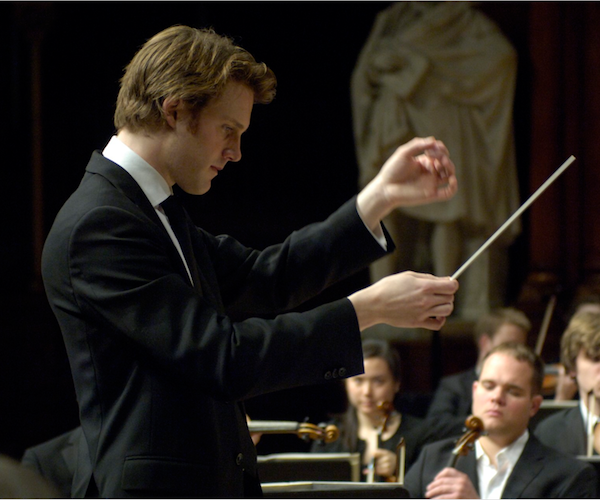Classical Music Commentary: Closing Thoughts on the Discovery Ensemble
For those who got to know the Discovery Ensemble over its truncated life, this was a vital ensemble, one that regularly embodied all that’s good about classical music.

In its six seasons, the Discovery Ensemble, led by the charismatic conductor Courtney Lewis, plugged major holes in local orchestral programming. Photo: Eric Antoniou.
By Jonathan Blumhofer
It’s no secret that certain musical art forms, notably opera, have struggled to gain a foothold in Boston. But instrumental music has, generally, fared better. So it came as a shock when, last week, one of the city’s brightest lights, the Discovery Ensemble, announced that it was shutting down operations, effective immediately. The explanation given in the press release cited “increasing difficulties faced in expanding the donor base and identifying additional Board members in Boston’s saturated performing arts scene.” The group’s artistic director, David St. George, told the Boston Globe that the ensemble, whose budget stood slightly in excess of $300,000, was faced with the prospect of raising all its funds this summer: “We’ve been in a place similar to this before,” he told Jeremy Eichler, “but we just couldn’t do it yet again.”
In its six seasons, the Discovery Ensemble, led by the charismatic conductor Courtney Lewis, plugged major holes in local orchestral programming. Over the last two years, when I’ve reviewed them, I’ve been unashamed in my enthusiasm for the orchestra: their four-concert seasons blended familiar repertoire with substantial doses of music that should be better known; the end results were often profoundly illuminating. I’ll not soon forget the December 2012 concert that paired Esa-Pekka Salonen’s Five Images after Sappho with Beethoven’s Second Symphony, in which the sprightly energy of the latter fed off the whimsy and haunting color of the former. Or the concert that shared John Adams’s witty Chamber Symphony and Haydn’s magnificent Symphony no. 92 in early 2013, in the process demonstrating just how much the music of the near present and distant past actually have in common.
While last year’s programs hewed more closely to traditional paths, they still offered ample rewards. There was a grand, haunting reading of Sibelius’s austere Symphony no. 6 in October and vital, terrific performances of Tchaikovsky’s Serenade for Strings and Haydn’s Symphony no. 102 in April. Among the soloists who appeared with the group in its final season, Shai Wosner and Nicolas Altstaedt stood out for their beautifully articulated performances of concerti by Mozart and Haydn, respectively.
Even more important, the Ensemble embraced its role as musical ambassador in the community. Lewis was particularly adept at this: his easy way talking with audiences and his ability to break down musical complexities into easy, memorable jargon made him a natural with both the Ensemble’s regular audiences and with school children the group visited. In early 2013, I followed them on an outreach event to St. Rose School in Chelsea, an hour-long event that gamely mixed play-acting silliness with top-notch music making. Throughout, the kids were riveted, with both Lewis and education director Michal Shein fluently entertaining and educating their captive audience.
Alas, heaps of critical praise, brilliant playing, clever programs, a noble commitment to community involvement, and the goodwill of performers and audiences wasn’t enough to sustain the Ensemble through a tough economic situation. St. George suggested that the abundance of groups in the region made things difficult, as did the limited resources of the Ensemble, which precluded its forming a strong marketing and development staff. “I think it was in part donor saturation,” he told the Globe, “but it was also in part that most of the potential donors in the city never found out about us.” If that was the case, more’s the pity.
The fact is, for those who got to know the Discovery Ensemble over its truncated life, this was a vital ensemble, one that regularly embodied all that’s good about classical music. Far from fusty, they explored the nooks of the standard canon, breathing life into over-familiar repertoire that can too often sound staid and stiff along the way. They didn’t shy away from underplayed contemporary fare, either, but managed to present it in ways at once uncompromising and accessible. Their playing was consistently marked by palpable joy and enthusiasm. For a few times a year, they made musical life in Boston inestimably richer. And they will be sorely missed, at least by a few.
Jonathan Blumhofer is a composer and violist who has been active in the greater Boston area since 2004. His music has received numerous awards and been performed by various ensembles, including the American Composers Orchestra, Kiev Philharmonic, Camerata Chicago, Xanthos Ensemble, and Juventas New Music Group. Since receiving his doctorate from Boston University in 2010, Jon has taught at Clark University, Worcester Polytechnic Institute, and online for the University of Phoenix, in addition to writing music criticism for the Worcester Telegram & Gazette.
